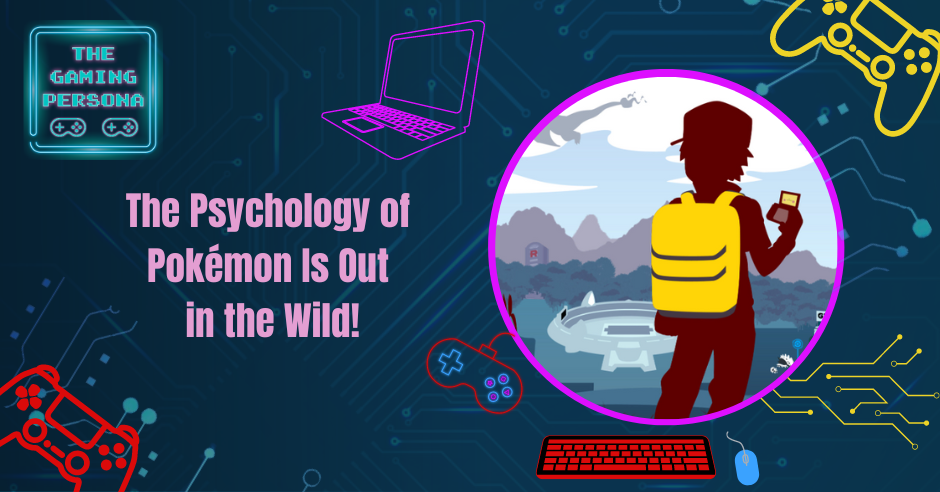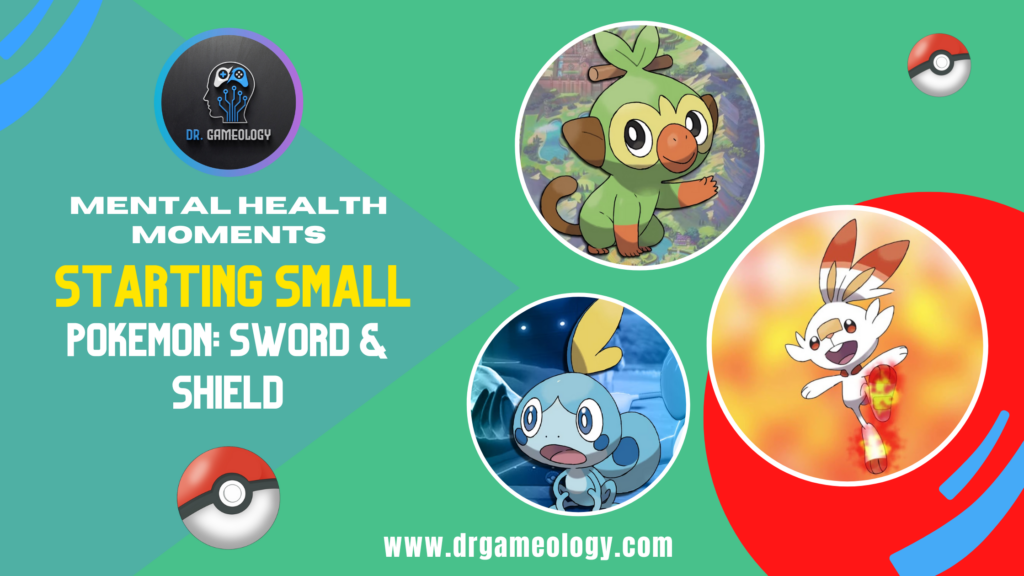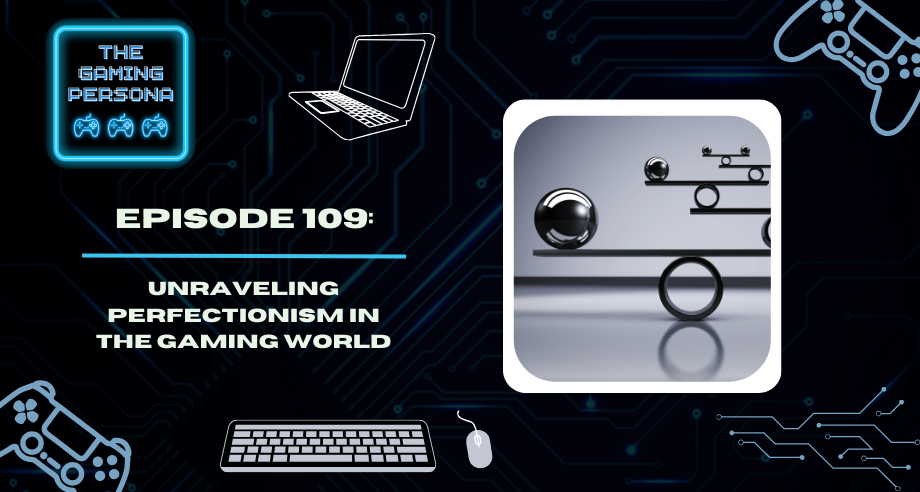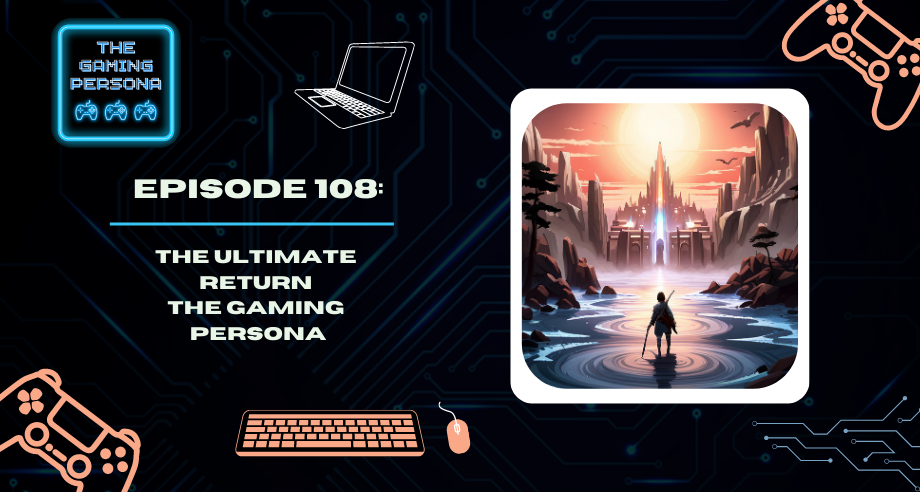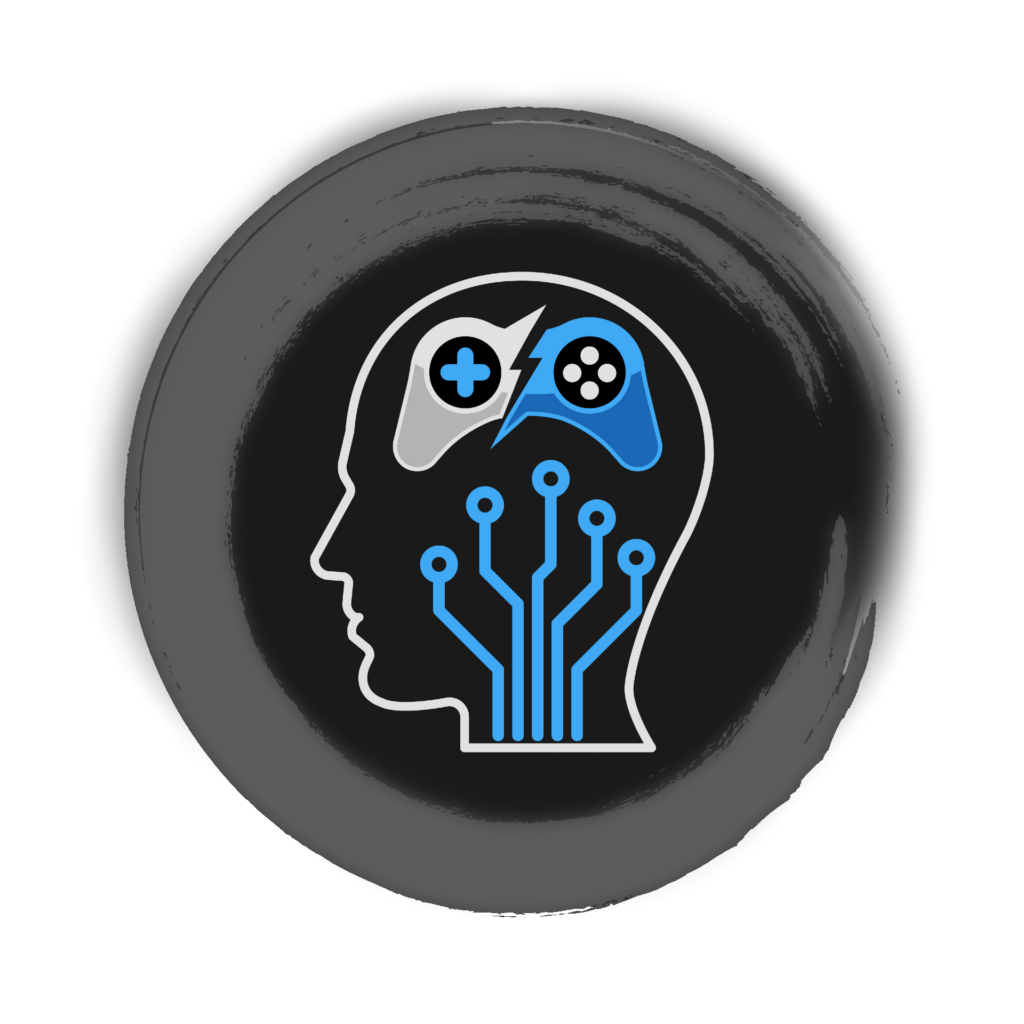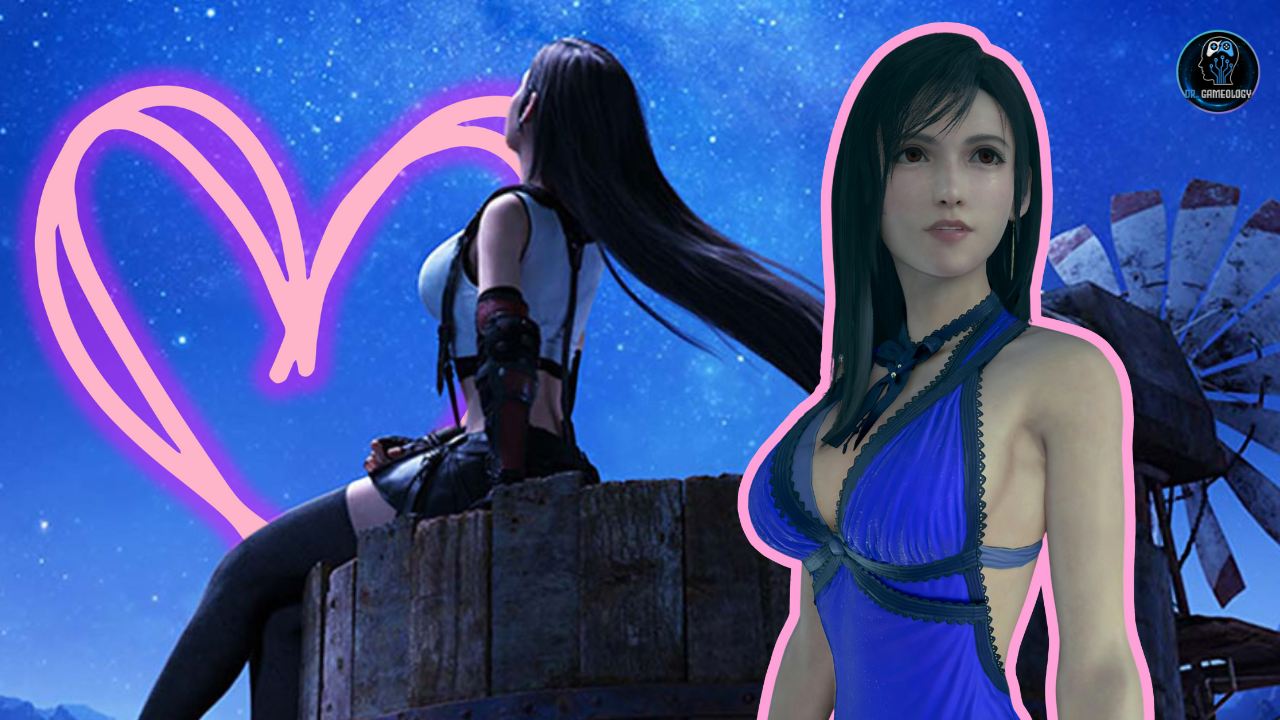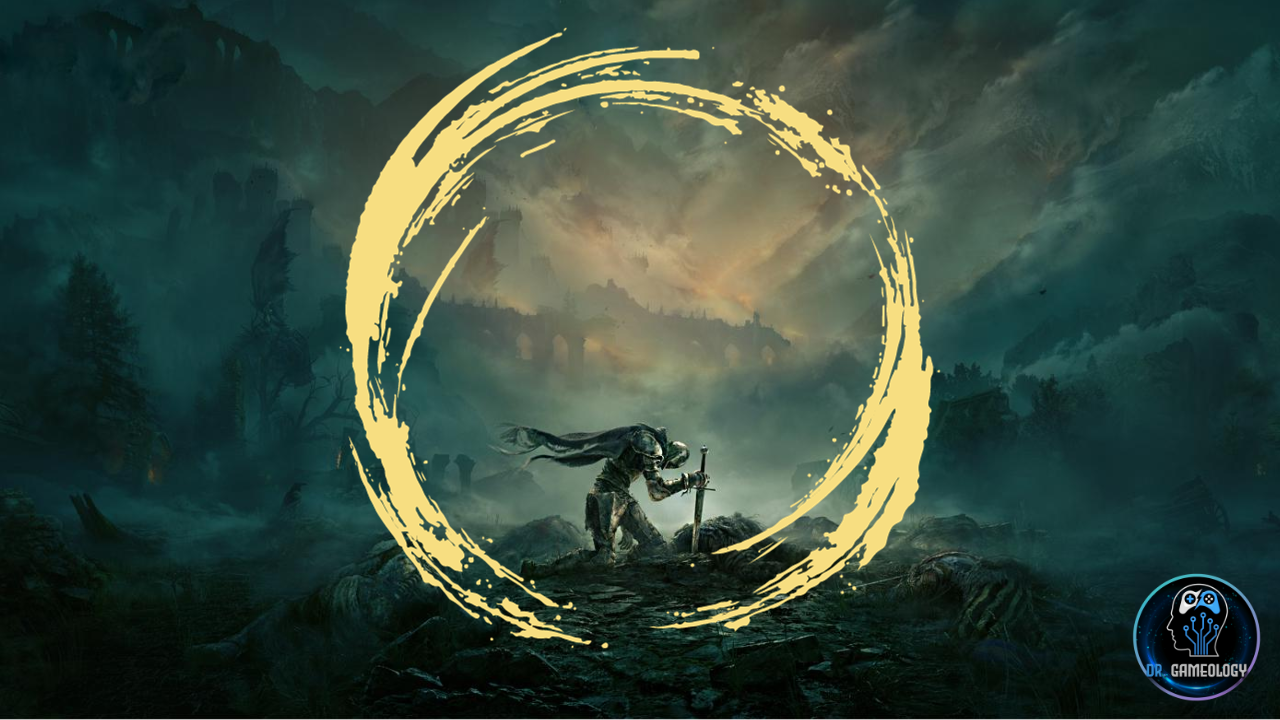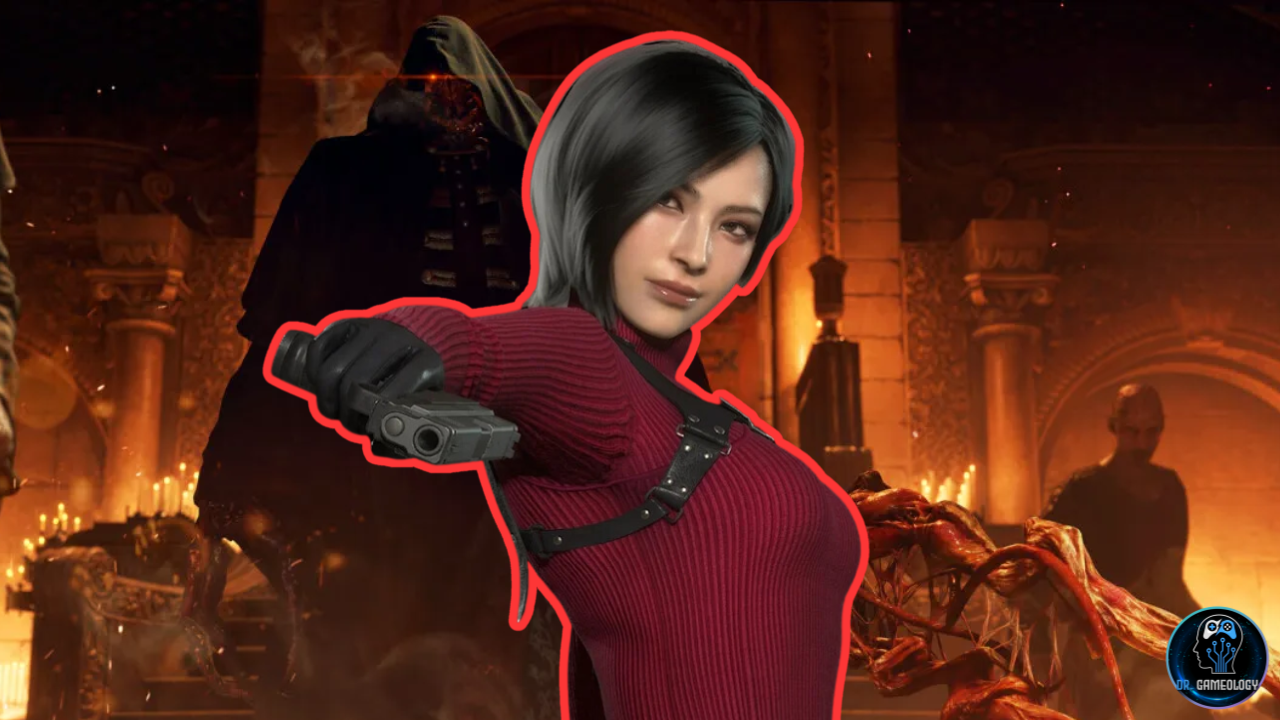Dr. Gameology is joined by Jenny and Gene to discuss the growth of the show and the release of “The Psychology of Pokémon: The Power to Catch ‘Em All.” Dr. Daniel Kaufmann, the real life person behind Dr. Gameology, wrote Chapter 15 of this book, and is getting ready to talk about it at Orlando Nerd Nite. The Gaming Persona crew talks about different ins and outs of seeing the Pokémon party have an impact in daily life so we can all aim to be our very best!
Gaming Library:
Pokémon, Danganronpa 2, Dark Souls, The Witcher 3: Wild Hunt, Fallout 3 / Fallout 4, Bioshock
What are we talking about from the world of video games today?
We are going to talk about the Psychology of Pokémon.
You mean the critically acclaimed book that I’m holding in my hands right now?
That’s the one.
The Ordinary World
All right, well, I’m excited for that. So, let’s share our Ordinary World with people and talk about everyday life through our games. All right, so what have we been doing in gaming?
Nothing.
I’ve found the sound effect, Jenny. It’s going to happen.
Okay, this was the busiest wedding weekend of my entire life.
[Murmurs] Busy, busy, wedding, wedding.
It was. It was so crazy. I had three weddings in a row. Back-to-back Friday, Saturday, and Sunday. And that destroyed me. I literally woke up, drove three hours didn’t wedding for 10 drove another three hours home fell asleep. Woke up drove again. It was bad. Three days.
Yes. Statistically one and a half of those weddings are going to lead to divorce.
Yeah, we don’t talk about it. Oh man via so there is no time for gaming for me.
I’m sure everybody can get some kind of therapy sessions I’ve been doing. Mental Health Tip: If you’re married, you probably shouldn’t be using the tinder app.
Routinely.
Yeah, that routinely put a damper on things.
Well for somebody? Yeah, maybe not for you. It’s all about delayed gratification and appreciating the sources of said gratification. Mm hmm. Yeah, it’s like, I only get happy by doing things in my Pokédex!
Oh, no. Oh.
Gene, what did you do this week?
Let’s see. I’ve been playing a game called Griftlands. It’s an interesting card battling game. Where most car round games don’t really have an in depth. Like, plot, right. But this game, it kind of does. Because you have two decks you have a combat deck and a debate deck. The second deck you have is full of cards that you’re used to argue with people, you have like things like add homonyms and non sequiturs and stuff like that in this deck. Like he used to just basically wear people down mentally. Like, so like, unlike a normal RPG where you just pick dialogue choices, when you go through to the people, and you want them to make a certain decision. You have to play your argument deck against them and wear down their mental health. And it’s interesting so far, like a car battering game. This game actually has a branching narrative depending on who you decide to use your combat deck on and kill them or use your argument deck and just annoy them.
Okay, that sounds like a lot of marriages that I interact with is a counselor as well, just that it’s like domestic violence, or psychological abuse.
But it has an interesting concept because it’s like you can, like you could totally just join with, like, there’s, there’s like a point in the game where it’s like, you can join the government and kill off the rebels, you know, using combat, or you can argue with the rebels to join you and fight the government using the cop using the argument deck. So, the using of the two decks and how you build the two sides, it’s really, like, really changes the story of the game.
I’m terrified at how connected this game is to the way reality actually works. Gene, okay. Oh, man, I actually have been playing a lot of different games, in bursts, because they all have particular purposes, in the things that I’m working on these days, so everyone can read into that whatever they want until the time is right. But Gene, there is one game that I played for hours consecutively this week that is not listed. Therefore, there’s no way you could have prepared to talk with me about it. Okay. And you reminded me of it because you talked about arguing with people. And I just wanted to go, you’re wrong, or I agree with that. I started playing Danganronpa 2. All right. And we got through the first trial. I’m not going to say who died. But Gene, you’ve played the entire game, right? Yes, yes. Midway through the non-trial part of the first chapter, I said something like, that character is definitely blank. And I’m not talking about a character that has exactly the same name as their name in the first game. I’m talking about a character that has to be the same person from the first game. So, my question is, are there many, many, many people in Danganronpa 2 that are suspiciously from Danganronpa?
Suspiciously? Yes.
Like you’re not supposed to catch on to what they’re doing. Because I’m either losing my mind or going complete conspiracy theory on what Danganronpa two is, and I love it.
There might be a couple. I wouldn’t say a lot. But yeah, couple.
Oh, man, because we were totally doing name analysis and looking at physical features and taking the yarn on the wall and doing the Charlie Day meme like about who all the people are. And it was a really fun way for me and my wife and son to spend Sunday together, because I was gone Thursday through most of Saturday, doing PAX West and that’s the bulk of my ordinary world is I got to do the psychology of poker game on panel for PAX West. And it streamed live from the horse theater on Twitch, for anyone who wants to track down the 2:30 session for the Horse Theater. The video is there.
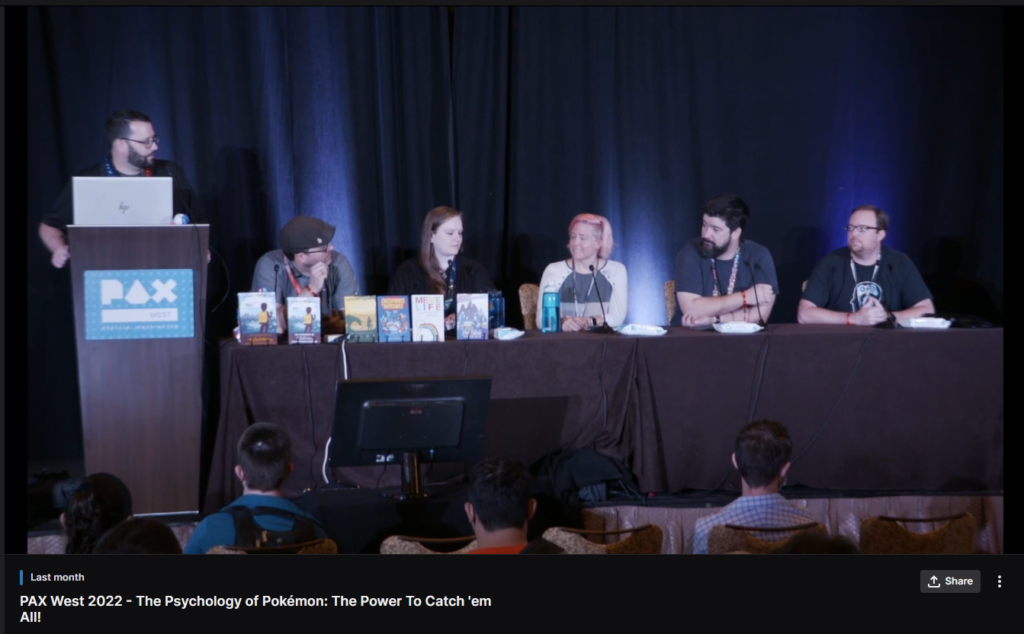
View the panel from the Twitch Broadcast here!
I got to be on stage with some friends that have been on the show already. Doctor, Anthony being Dr. Shane Tilton. They were both on stage with me. And then I had three other people. One of them was Dr. Amelia Herbst, who was on my Dark Souls panel, also from PAX West, but in 2021, so I got to reunite and collaborate with her. And then there were a couple other people as well, Lindsey and Joe, I don’t know the last names, but they were awesome to meet. And we talked about different psychological features from the Pokémon franchise of video games, anime, manga, and mobile games. So, we’re going to talk a little bit about that. I also played Fallout three and four in parts this week. And I finally started a playthrough of The Witcher 3:Wild Hunt that I have to see through to the end, because reasons.
It seems like a ballsy move to play Fallout 3 and 4, simultaneously.
Oh, okay. There’s a story behind that. Do we have time? I mean, we’re at the 10-minute mark, I wanted to do a short episode. Ah, okay, so TLDR I wanted to include Fallout 4, I thought, in a chapter of my book that’s about Crossing the Threshold, because The Vault is majorly a threshold. You cross that line, and the game is completely different, because now you’re in the nuclear wasteland. Right? Except all the memories I had about that moment, were from Fallout 3, not 4, because I’ve never played 4. And so, I started 4. And that game is all about getting into The Vault with your spouse and your baby. And then you’re cryogenically frozen, and then people unfreeze you, shoot your spouse in the head, take the baby, freeze you back. Then you thaw out later, and you’re like, “What the heck, I must go get my baby.” It’s actually a really compelling story, and I want to play it. But that’s not what my memories were about.
I remembered living life in The Vault and experiencing several different phases of childhood in The Vault and having to experience the structure that society being designed to convince you that you just want to stay in The Vault. So, leaving The Vault is, in my opinion, a much bigger transformation in Fallout 3. And so really, all I did is I compared the tutorial segments of times. And it’s unfortunate because obviously the gameplay is smoother in 4. But any video game where your dad is Liam Neeson usually wins. So as far as which story would I want to continue playing if I had time for a Fallout game right now it’s 3. Just as a person who only played the beginning parts.
The other important thing is I found the “Duty Failed” sound effect for Jenny. So great. Yeah, cool. You’re welcome!
Thanks.
The Magic Flight
So, let’s go to our next segment. We haven’t used this segment very much. But there’s a really cool reason for us to do this. It is called The Magic Fight, where we share in the ultimate triumphs of our heroes and selves. All right, tomorrow evening, which will be two weeks ago, by the time people hear this episode. Because we’re on a 10-day editing cycle. I am talking at Orlando Nerd Night. And I’m going to be talking about some psychological insights that we get from the Pokémon games, which is something that I get to talk about all the time.
But I didn’t even know about Nerd Night, except because of my friendship with you, Jenny. So, you told me about it. And I believe after work in about 2015 or 14, late 14, I went with you to one of them. And then I talked to Ricardo. Because you told me that I totally could present at something like this. So, I just walked up to Ricardo is the person that still organizes it. It’s his baby. It’s his thing. He’s still doing it. But this is late 2014 about and I just said, you know, Hi, I’m a counselor, I love video games. And I’m always interested to present in front of people. And I did not think anything of it. I was just being nice. And then he messaged me on Twitter very quickly and put me in a situation where I either do the heroic thing and refuse the call, or I answer The Call to Adventure. So, in 2015, I was a doc student. I was pretty sure what I was going to research for my dissertation. And I did my first appearance for or night, I talked about the connection between player choice and personality type and the way we play different video games. And I talked a lot about the heroes that resonate with us, and morality in video games. So, the decisions we make, like when we’re saving or harvesting a will SR and Bioshock. I remember specifically talking about that. And, man, it’s just it’s so interesting to think about getting to go back. Being in The Hero’s Journey language, part of The Return is the Master of Two Worlds. And I really do feel like the discussion of what I became versus what I thought I was going to be that first time is a really exciting opportunity.
Yeah. Oh, I love that. I remember. I remember the first time I remember it was very heavy SWTOR time for us.
Yeah, Gene, you were actually playing with us at this exact point in time for timeline awareness. But you were in Tallahassee?
Hmm.
Well, I’m excited to see you speak again tomorrow. Yeah. Oh, my gosh, you. Literally, I heard that word. I was like. Ughhh
Oh, goodness. Anyway. Yes. I’m excited to see you again tomorrow talking about pokey mod.
Yeah. So, I just thought it would be nice to put our episode together in a way that will be easy to digest. There are so many chapters in the book, we can’t cover all of them. And some of them, I really do want to save for opportunities with the authors who wrote them. Yeah. But I also want to just practice having a 15 minute or less conversation about poking on the idea of Nerd Nite is kind of modeled around a TED Talk style. Yes. And anyone who’s listening to this show knows that I haven’t explained anything in under 15 minutes in about seven years.
No, I’m quite worried about this. It’s your, the bane of your existence that time limit? Yeah, do it.
Thanks, Jenny. I actually was thinking about just doing maybe two slides with content and the rest are just pictures.
Yeah, do it. If anyone could do that, it would be you?
Yeah, I well. Also, it’s about there, there are things that I have to complete every day now that are pretty intense. I’ve got I’ve got a writing calendar that is not very forgiving. Right now. So, I just want to go around with both of you. We talked about the chapters in the book prior to recording. And I am curious what topics from Pokémon really have some kind of connection with you, even if it’s something by the way, that’s not a chapter in the book. We’ve done 80 Something episodes of this. So, we’re allowed to decide what’s relevant in the psychology of video games. If we feel like there’s something that really just speaks to our perspective on it, so what do we what do we want to talk about with the value of Pokémon to our mental health journeys?
Okay, so we, before the show, we went through and read all of the different chapters from the book, and a few of them stood out to me. But I’m not even sure if what if this is what this chapter is about. But one of the chapters mentioned the journey of attachment and healing. And to me, that just made me think about different attachment styles. And so, in the past couple of years, I’ve been in therapy for a couple years now, and I did a little bit of like work and research and reading about attachment styles and how They affect your relationships with people, things to look out for, and stuff like that. So, I wanted to think about what, what the different attachment styles, how they would manifest in a game of Pokémon. And, yeah, I mean, it’s by no means a scientific discussion on my part, but I just thought it’d be fun. So, some of the, so I’m going to name three of the different attachment types, and there is a fourth. But to be honest, I, maybe you guys can help out with this. I don’t know how I would fit this into my little scenario. Okay, so the first attachment style is anxious attachment. And so I’m thinking about this, like in the context of when you’re trying to catch poker on right, so you throw your poker ball. And you’re, you’re, you’re battling them trying to, you know, make them go to sleep, so that you can catch them. But sometimes it doesn’t always work. And sometimes they run away. And that’s, to me as an anxiously attached person is like, the most terrifying option. Like, please don’t run away. I need you here. And then there’s avoidant attachment. So, the idea there is, if you’re trying to catch poker on I don’t even care if you stay or go. And then they’re secure attachment. So, to me, that would be okay. I have plenty of hokum on who I love, and we take care of each other. And they, they battle for me, and I make sure they’re kept. Well, it’d be great to add another Pokémon to my collection. But if not, then, you know, I’ll catch up to them. So that was my short little what came to mind when I thought of attachment and Pokémon. So, the last attachment style is a fearful avoidant attachment. So, it’s kind of like a mixture of both anxiously attached and avoidant attached. So, I couldn’t think of a fun little quip for that.
Oh, that’s like, you don’t even go into the grass. Because you’re afraid that if you did try to catch a Pokémon, it would inevitably avoid the ball and you wouldn’t catch one anyway. And then you’d be faced with the real out reality that your Pokémon trainer, they can’t train any Pokémon This is what procrastination is. Yeah. So, I knew you’d be able to run away before you even engage the activity.
There you go. There you go.
Jenny, I know you can see me in the webcam, but that doesn’t necessarily translate into the audio version of our show. But when you said, your chapter you picked, and then you just went off, like there’s four types, and I’m going to Professor this stuff for everyone. I was like, oh, my gosh, I don’t have to persist to the table. Like a proud parent moment. Oh, I love it. I try to be egalitarian as much as I can. But wait or rock that topic?
Thank you. Thank you.
So I think the whole anxious attachment thing is completely encapsulated by the existence of the stupid Safari Zone.
Oh, wow. Explain that.
Please explain that, because I’m not as well versed in Pokémon.
I’m playing all against I don’t know how many games it’s actually featured in I know it’s at least in the first generation.
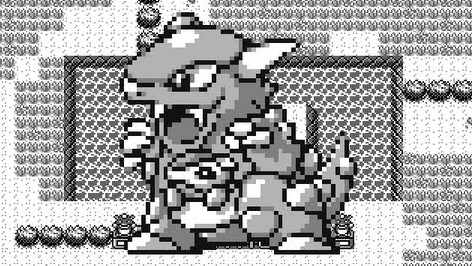
Yeah, first generation definitely has it. That’s how you get Kangaskhan.
Yeah, I don’t know that ever came back. But the Safari Zone is unlike normal Pokémon rules where you because you don’t you don’t go into the Safari Zone with your Pokémon, and you don’t battle anyone. You just roam around the grass and things come at you. And you have to use a different a mixture of either bait rock rocks, rocks, or to basically kind of annoy the monster into sticking around long enough for you to throw your bug your safari balls at them.
That’s how I lecture my students. Yeah, I annoy them long enough for them to buy into the idea of what counseling is.
Yeah, it is an incredibly bogus method of catching these Pokémon.
Hey, I put everything I’ve got into that Gene!
Does #RNG make any #videogames better? Is this a learned response or a built in process? Games like #Pokémon help us begin learning lessons for EXP grinds and delayed gratification. Share on XYes, I’m sure your method is better than a safari zone. So, because as far as our method, the monster can immediately run away before you do anything. Its very luck based. It’s like, “oh, yeah, like, you can throw like 10 foods at them, and then one, poke them on ball, and then they’re gone.” Like, like the amount of food versus the number of rocks is not mathematic. It’s all RNG.
That’s why I probably hated the Safari Zone, even in my younger years. I don’t like RNG at all.
That’s also a giant waste of time, because you’re not there for 9000 Rapidash. You’re there looking for either a Chansey or a Kangaskhan? Or Eggsecute? Or a Pincer, I think? Or Scyther? Yeah, yeah, yeah, there’s like four guys in there that you wanted. And there’s 9000 other things that just are wasting your time?
Yeah. Well, that’s, that’s poke him on the Safari Zone. I remember the last time I felt this, there’s a glitch that is outside the city with the water gym. And if you do everything specifically, and correctly, you get different trainers to challenge you. And you use Abra to teleport back to the Pokémon Center. And then the next time you get to the end of the Nugget Bridge, Mew will attack you. And this is the only way without official Nintendo game free giving you mu in that game. So this is Red Version, Blue Version and Yellow Version, or Leaf Green / Fire Red. So, if you want to do that, you have to find Abra before you pass that part of the game, there’s only one place to get Abra and his or her appearance rate is minute, miniscule. It’s annoying, because you’re getting attacked by all these things that you don’t want to catch. And, you know, that’s just one example. But Pokémon is always inevitably, if you’re looking for a Rapidash you’re going to be attacked by many Geodudes, if you’re looking for a, you know, Caterpie you’re going to get attacked by many Kakunas. And it’s annoying.
Yes, and.
But there is actually a chapter about perseverance, and grit and putting up with all of these feelings, too. I think that when we’re playing a game like this that has so much random number generation underneath the surface, when you look at how it works, we are learning lessons repeatedly, every minute that we play, that we can make really good choices, and there’s still that element of surprise, it might not go our way. And at that point, we’re going to choose to keep going and keep trying or we’re going to go do something else, the Give Up option, which sometimes is acceptable, because giving up is just refocusing our energy into something that’s a better use of our time.
Yeah, Indeed.
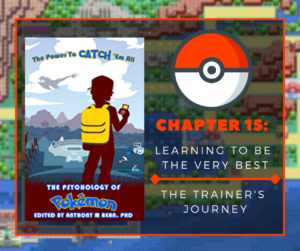
So, for me, I wrote the chapter at the end of the book that is about developmental psychology, gaming motivation, and the journey that we experienced when we play the Pokémon games from the selection of our starter Pokémon, all the way to the completion of the Pokédex or the defeating of the Elite Four and becoming the Pokémon champion. And Jenny one of the things that actually is about attachment style, is actually the selection of what our Pokémon Battle party or traveling party looks like. Because the beginning of the chapter you picked the first set of words is your too important for Bill’s PC, right bills PC is the computer system where you put all the poke him on, you’re not carrying with you. So, when you get when you get attacked, you have your lead Pokémon that comes out first and you have five support Pokémon in your pocket that you can switch out to use for an advantage in battle. And one of the things I talked about in my chapter is actually the advantage system in the original generation of Pokémon for Kanto region has the original 151 Pokémon. And it has a slightly simplified List of Pokémon types. So, there you know, there’s firewater grass lightning psychic, there are some that show up more prominently later in the franchise. So, I didn’t comment on those. But the idea is, you can pick your party because of strategy. You can pick it because you want to champion a certain style. And no matter what, I’m going to destroy everyone with this one type of poker game on and if you chose fire or psychic, you’re correct anything else I’m questioning your mental capabilities. That’s, that’s my bias. Of course, other choices are viable. That was a joke, everyone. But you can also pick for aesthetic purposes, you can pick because you like a certain Pokémon, and it doesn’t matter what they bring to the table as a combatant. So, Jenny, now that I brought Bill’s PC, the storage system and type advantages. What would you probably choose when you’re thinking about the six Pokémon They get to walk around in your pocket?
Oh, I definitely would choose the Pokémon that I just like better. There would be no strategy behind it. All right. Articuno, because she’s pretty.
All right. You know, as far as RNG goes, the Kickstarter that I supported for the printing of the books came with 10 bookmarks for the 10 copies that I ordered. Eight of them were Articuno. I question the randomness.
Oh, come on.
Yeah, I’ll give you a bookmark. So, you got Articuno. Do you have any others that would definitely fit in there?
Um, I would say Eevee, but probably.
Yeah, Eevee is everything.
Eevee is a #Pokémon that that can become many different types under specific conditions. This metaphor can be encouraging in our #mentalhealth journeys. Share on XYeah. Eventually, Evie wouldn’t be Evie, but I love Eevee. That’s my second favorite. Pokémon. And I don’t know. I like right now. My car air freshener is Jigglypuff. Okay, maybe Jigglypuff would make it in there.
What is that scent?
Bubblegum.
Interesting.
Yeah, who else who else? Oh, I also really like Rapidash. I like the cute little ones.
All right. So, Gene, I’m interested to ask you a similar question. How do you choose your party as a Pokémon trainer.
So, if we’re just talking about the journey, not the final team, I look at it as a as a time investment, so to speak. I don’t like to just grab a buck by using four or five levels and then switch them out. I look for the Pokémon that I’m going to be using for a big old stretch of time. So, the classic three evolution ones like going from Caterpie to Butterfree as a great use of time because it’s it keeps getting better as you go. versus something like a I don’t know. I’ve done sparse. It’s the same lameness the whole way.
One of the original Pokémon, What did you say?
No, Dunsparce isn’t Gold and Silver. It’s a monster that well just kind of generally sucks. It’s very mediocre at everything. So, it’s like, you don’t get anything in reward for using it.
I tend to think somewhat similarly, but I want my party to have a sense of power. Or you know, like this is a special collection of Pokémon. So, you know, I would want to have one of the mythical birds, I would want to have mu two or mu or both, because mu is cool, because he has the ability to do every move. And that is something in video games that has always been exciting to me is characters that are not bound to a logical system of what they can and can’t do. And perhaps I tried to replicate that with the number of tests I take on in my workday.
Because you are Mew!
For more Gaming Motivation ideas, watch this Mental Health Moment from Dr. Gameology on Twitch!!
I think so. And I’ve never put that together until challenging myself to explain this right now. But it’s like, I, I’ve been thinking about this a lot. And I love the fact that I wrote this chapter, I love the fact that it opened up this whole other opportunity to write things that people will read, and hopefully enjoy, I think they’ll enjoy them. And it puts my name in with the lineage of people that talk about fandom properties and psychology. And those people I’ve been looking up to for 20 years, you know, so the fact that there’s people that will get to the end of this book, they’ll see my name, and they’ll think about my ideas, and they’ll be like, that’s so stupid, or I really relate to that one. And just the fact that they’re thinking anything is actually such a big victory. For me, it’s super effective, right? I think that a lot of people could just teach classes, or they could counsel, or they could do one of those things every day. But I, I do the five main things that I feel my purpose is almost every day. And it’s just because video games taught me to grind EXP, Pokémon taught me to grind EXP. And now even with EXP share, that’s such a huge shortcut. I mean, like, well, I want to level up, Onyx. So, I need to go somewhere where rock type Pokémon are not going to get wrecked. And you know that logical system that I have about how to complete tasks and how to gain EXP that’s going to be valuable and make me more useful. A lot of that came from 12-year-old me figuring out how to win every single cup in Pokémon Stadium, using the different berries and the different level ups to make sure I have the optimized level 25 Or under party and the optimized level 50 Or under party and then you know make sure Mewtwo and Mew both have Hyper Beam and are at level 99 or 100. I think Pokémon original went to 100. Yeah, so the like unlocked level party. And, you know, Pokémon is such a critical part of my strategic thinking and way of organizing tasks, to be effective with things that I think are my goal. So, I’m going to stop there because I don’t think 15 minutes gives me time to say anything else. So, let’s go on to return.
All right, yeah.
The Return
So, we can go back to our daily lives and take our next step forward. So, you know if it first off, I would like to say for The Return if anyone found this episode, exciting, support the book support Leyline Publications, you can get the book, from their website or from Amazon. I think there’s a lot of really good ideas. It’s really packed. It’s the biggest book they’ve made so far as well. So, what are we going to take with us into the coming week?
Well, while we’re on this topic of Pokémon, a game that’s been in development a long time called Temtem. It’s a kind of a Pokémon MMO clone sort of thing that recently got its 1.0 release. So, I’m looking into that and see if it’s any good. Cool. Yeah, might as well come on by now. Wow, there’s like, you know, you grew up with people you do classes and stuff. So hey,
It’s not the game with where the Pokémon have guns and you get to shoot them down. Well, no, there’s this there’s this crazy modern game where you run around and you shoot the Pokémon with guns instead of catching them. It’s a terrible it’s a monstrosity.
“Gotta poach them all.”
Oh, no. I just keep steering us in the dark direction when I’m not all humanistic and hopeful.
I am looking forward to Nerd Nite tomorrow and also my copy of the book. [wink wink.]
Yep, that will be coming your way. And I just have to do the I have to do the Nerd Nite talk. I have to just I have to stay focused. And I have to keep doing what? What matters the most. So I think that’s actually good advice for everyone. That will be the final quest for the week. Do what matters the most grindy XP. SHARE with others. Find the cube Pokémon and continue the journey.
See you next week. Bye.

Important Links
- @DrGameology – Twitch
- Apple Podcasts – The Gaming Persona
- Spotify – The Gaming Persona
- Google – The Gaming Persona
- @J.LebronPhotography – Instagram
- JLebronPhotography.com

